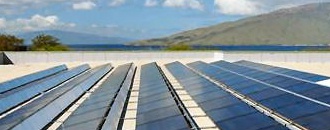PUC Decoupling Decision Implements New Electric Rate Setting Method
The Hawaii Public Utilities Commission (PUC) Wednesday issued a final decision on Hawaiian Electric Company’s 2009 rate request.
That decision is expected to result in a small credit for Oahu electric customers and implementation of a new rate setting method called “decoupling”.
For Maui Electric, a subsidiary of Hawaiian Electric Company, decoupling will come a little later when the PUC issues pending rate case decisions.
Previously, the PUC had approved a 5.7% interim increase, or $74 million in annual utility revenues. Most of that increase has been reflected in electric bills since August 2009 and the remainder since February 2010. In its final decision yesterday, the PUC affirmed most of the earlier increase but made minor adjustments for software and other costs that will trigger a small refund for Oahu customers.
Hawaiian Electric must still perform calculations for a detailed refund plan to be sent to the PUC for approval. However, a rough estimate of the refund for a typical residential customer using 600 kilowatt-hours a month is about 11 cents plus interest. This will be returned in the form of a one-time credit on electric bills after the PUC approves the refund plan.
The PUC’s final decision does not change its earlier approval of cost recovery for operations, other costs and capital improvements made to Oahu’s electric system through 2009.
The original rate increase request was to help cover more than $375 million in investments in new capital projects, including much of Hawaiian Electric’s $196-million Campbell Industrial Park generating station The 110-megawatt project, fueled by renewable biodiesel, represents a significant step toward reducing Hawaii’s dependence on imported fossil fuels.
Decoupling is one of many major policy steps needed to support efforts to reduce Hawaii’s dependence on imported oil.
In the past, utility gross revenues were based on the amount of electricity used by consumers. This meant the utility earned more money when demand for electricity increased. This practice is directly at odds with Hawaii’s clean energy goal of reducing use of imported oil through energy efficiency and increased renewable energy. Increasing energy efficiency and using more renewable energy will help make bills more stable and lower than if we continue to depend so heavily on imported oil, which is expensive and has volatile prices. More than 50% of electric bills currently go toward paying for fuel costs.
The PUC used the decision in this rate case to confirm the functions it expects the utility to perform and set the revenue level for the utility to recover the costs of providing these functions.
In the future, the non-fuel portion of electric rates will adjust annually as electricity use goes up or down, so the PUC-approved revenue level is maintained. If electricity use increases, rates will decrease to avoid collecting excess revenue. If usage decreases, rates will increase to maintain the approved revenue level. Rates also would increase or decrease between formal rate cases largely based on an independent cost index and adjustments would be allowed to recover PUC-approved capital additions. This does not guarantee a set profit as the utility must still manage expenses efficiently.
Decoupling will have no immediate impact on customer bills. Any annual adjustment, after review by the Consumer Advocate and PUC, is expected to be modest and begin no earlier than next summer.
Also, although total utility revenues will no longer be tied to customers’ electricity use, individual electric bills will still be based on the amount of electricity a customer uses, so customers will still have an incentive to conserve and use electricity efficiently.











